Macheras was a Roman general. According to Josephus's Antiquities of the Jews , he was sent by Ventidius to assist Herod the Great with two legions and 1,000 horsemen. [1]
Macheras was a Roman general. According to Josephus's Antiquities of the Jews , he was sent by Ventidius to assist Herod the Great with two legions and 1,000 horsemen. [1]

The extant manuscripts of the book Antiquities of the Jews, written by the first-century Jewish historian Flavius Josephus around AD 93–94, contain two references to Jesus of Nazareth and one reference to John the Baptist.
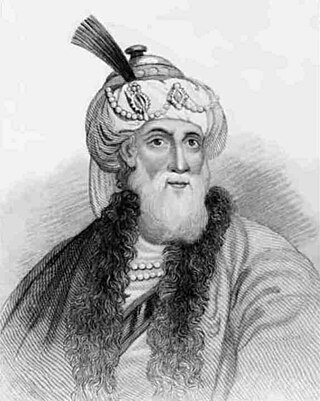
Flavius Josephus was a Roman–Jewish historian and military leader. Best known for writing The Jewish War, he was born in Jerusalem—then part of the Roman province of Judea—to a father of priestly descent and a mother who claimed royal ancestry.

Titus Caesar Vespasianus was Roman emperor from 79 to 81. A member of the Flavian dynasty, Titus succeeded his father Vespasian upon his death.
Theudas was a Jewish rebel of the 1st century AD. Scholars attribute to his name a Greek etymology possibly meant as "flowing with water", although with a Hellenist-styled ending. At some point between 44 and 46 AD, Theudas led his followers in a short-lived revolt.
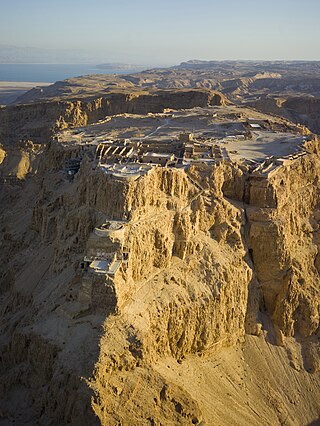
The siege of Masada was one of the final events in the First Jewish–Roman War, occurring from 72 to 73 CE on and around a hilltop in present-day Israel.
Judas of Galilee, or Judas of Gamala, was a Jewish leader who led resistance to the census imposed for Roman tax purposes by Quirinius in the Judaea Province in 6 CE. He encouraged Jews not to register and those that did had their houses burnt and their cattle stolen by his followers. He is credited with beginning the "fourth philosophy" of the Jews which Josephus blames for the disastrous war with the Romans in 66–73. These events are discussed by Josephus in The Jewish War and in Antiquities of the Jews and mentioned in the Acts of the Apostles.
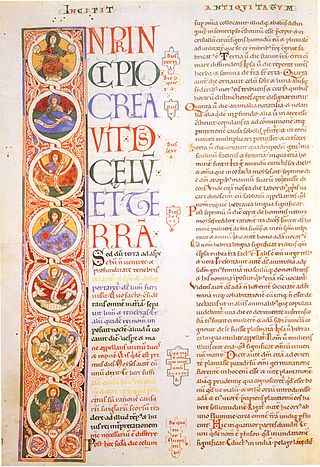
Antiquities of the Jews is a 20-volume historiographical work, written in Greek, by historian Josephus in the 13th year of the reign of Roman emperor Domitian, which was 94 CE. The book contains an account of the history of the Jewish people for Josephus' gentile patrons. In the first ten volumes, Josephus follows the events of the Hebrew Bible beginning with the creation of Adam and Eve.

The Jewish War or Judean War, also referred to in English as The Wars of the Jews, is a book written by Josephus, a first-century Roman-Jewish historian. It has been described by Steve Mason as "perhaps the most influential non-biblical text of Western history".
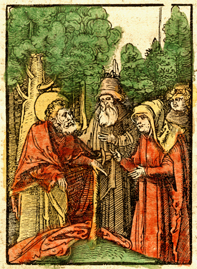
Matthew 3:5 is the fifth verse of the third chapter of the Gospel of Matthew in the New Testament. The verse occurs in the section introducing John the Baptist with this verse describing his popularity in the region.
The Life of (Flavius) Josephus, also called the "Life of Flavius Josephus", or simply Vita, is an autobiographical text written by Josephus in approximately 94-99 CE – possibly as an appendix to his Antiquities of the Jews – where the author for the most part re-visits the events of the War, apparently in response to allegations made against him by Justus of Tiberias.

Mount Arbel is a mountain in The Lower Galilee near Tiberias in Israel, with high cliffs, views of Mount Hermon and the Golan Heights, a cave-fortress, and ruins of an ancient synagogue. Mount Arbel sits across from Mount Nitai; their cliffs were created as a result of the geological processes leading to the creation of the Jordan Rift Valley.
According to the Bible, Medan ; also spelt Madan was the third son of Abraham, the patriarch of the Israelites, and Keturah whom he wed after the death of Sarah. Medan had five brothers, Zimran, Jokshan, Midian, Ishbak, and Shuah.
Justus of Tiberias was a 1st century Jewish author and historiographer. All that we know of his life comes from the Vita which Flavius Josephus apparently wrote in response to the assertions made by Justus in his History of the Jewish War, published around 93/94 or shortly after 100. Josephus is moreover the only writer to mention this document, but without ever citing the slightest extract. This History published by Justus seems to have disappeared shortly after the publication of the Autobiography of Flavius Josephus, because it is unknown to pagan authors and the Christian authors who mention it only quote what Josephus said.
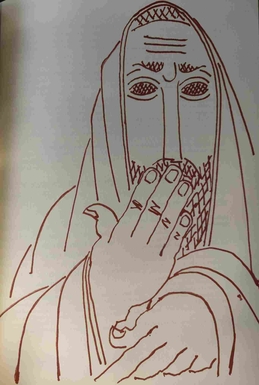
Simeon ben Gamliel (I) (Hebrew: שמעון בן גמליאל or רשב"ג הראשון; c. 10 BC – 70 AD) was a Tanna sage and leader of the Jewish people. He served as nasi of the Great Sanhedrin at Jerusalem during the outbreak of the First Jewish–Roman War, succeeding his father in the same office after his father's death in 50 AD and just before the destruction of the Second Temple.
Joshua ben Gamla, also called Jesus the son of Gamala, was a Jewish high priest in about 64-65 CE. He was killed during the First Jewish–Roman War. While the Talmud refers to Joshua ben Gamla, the earlier Greek works of Josephus Flavius call him Γαμάλα μὲν υἱὸς Ἰησοῦς a semitism for: The son of Gamala, Jesus.

In the Manethonian tradition, Salitis was the first Hyksos king, the one who subdued and ruled Lower Egypt and founded the 15th Dynasty.

Philip the Tetrarch, sometimes called Herod Philip II by modern writers, son of Herod the Great and his fifth wife, Cleopatra of Jerusalem, ruled over the northeast part of his father's kingdom between 4 BCE and 34 CE. He was a half-brother of Herod Antipas and Herod Archelaus and should not be confused with Herod II, whom some writers call Herod Philip I.

The siege of Yodfat was a 47-day siege by Roman forces of the Jewish town of Yodfat which took place in 67 CE, during the Great Revolt. Led by Roman General Vespasian and his son Titus, both future emperors, the siege ended with the sacking of the town, the deaths of most of its inhabitants and the enslavement of the rest. It was the second bloodiest battle of the revolt, surpassed only by the Siege of Jerusalem, and the longest except for Jerusalem and Masada. The siege was chronicled by Josephus, who had personally commanded the Jewish forces at Yodfat and was subsequently captured by the Romans.
Steve N. Mason is a Canadian historian of Judea in the Graeco-Roman period, best known for his studies of Josephus and early Christian writings. He was professor of classics, history and religious studies at York University in Toronto. He has been Kirby Laing Chair of New Testament Exegesis at Aberdeen University (2011–2015?) and works today at the University of Groningen, the Netherlands.
Pleistoros was, according to Herodotus, a Thracian god adored by the Gauls and the tribe "Absinthe" (Apsintieni) as the god of war. According to Josephus Flavius. Pleistoros was the god of war Dacians pleistoi, to which these Thracians offered sacrifices of men. The priests were recruited between nobles, some of whom are warriors.